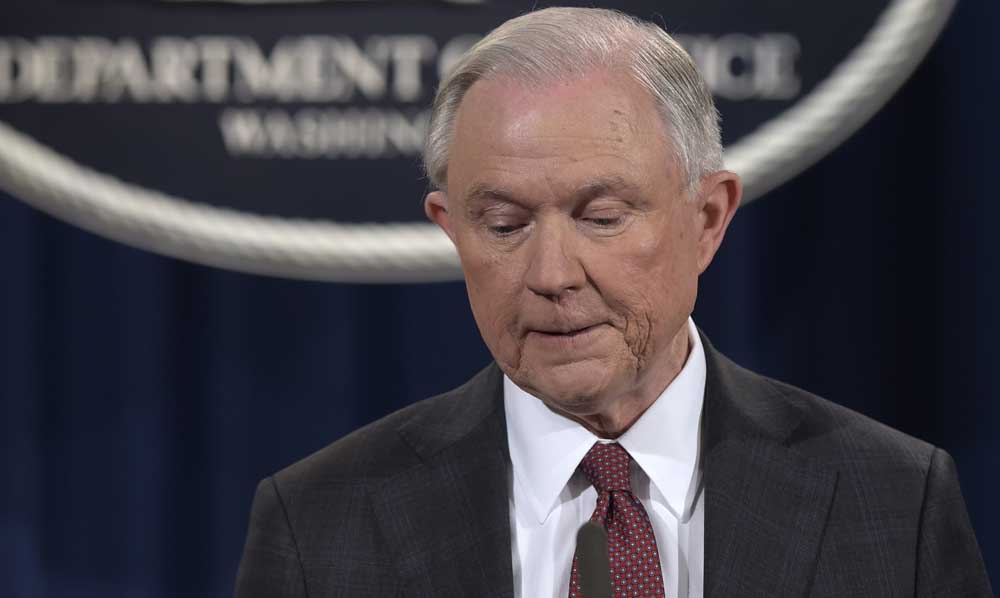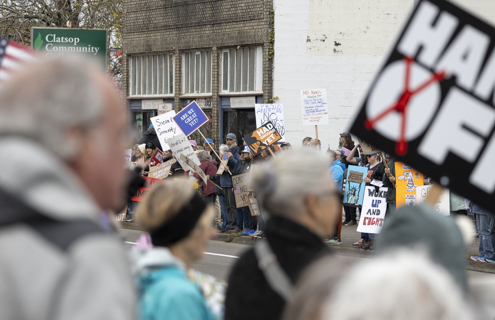World in Brief
Published 5:03 am Friday, March 3, 2017

- Attorney General Jeff Sessions pauses during a news conference at the Justice Department in Washington on Thursday. Sessions said he will recuse himself from a federal investigation into Russian interference in the 2016 White House election.
WASHINGTON — Attorney General Jeff Sessions may not have been clear about his contacts with Russian officials during the 2016 election, but this much is: The controversy over any Kremlin involvement in American politics is not going to fade away anytime soon.
Sessions on Thursday became the second high-ranking member of the Trump administration to take a hit over conversations with Russia’s envoy to the U.S., recusing himself from any probe that examines communications between Trump aides and Moscow but facing down calls for his resignation. An early backer and key adviser for Trump’s campaign, Sessions said his staff recommended that he step aside from a probe.
“I feel I should not be involved in investigating a campaign I had a role in,” he said.
Sessions’ action followed revelations that he twice spoke with the Russian ambassador and didn’t say so when pressed, under oath, by Congress. Though he rejected any suggestion that he tried to mislead anyone, he did allow that he should have been more careful in his testimony.
“I should have slowed down and said, ‘But I did meet one Russian official a couple of times,’” he said.
WASHINGTON — The Trump administration’s back-to-back controversies over its Russian ties now have at least one thing in common: Ambassador Sergey Kislyak.
Moscow’s top diplomat is a Washington fixture with a sprawling network, and he has emerged as the central figure in the investigations into Trump advisers’ connections with Russia. In a matter of weeks, contact with Kislyak led to the firing of a top adviser to the president and, on Thursday, prompted calls for the Attorney General Jeff Sessions l to resign.
Separately, a White House official confirmed that Trump’s son-in-law Jared Kushner and ousted national security adviser Michael Flynn met with Kislyak at Trump Tower in December for what the official called a brief courtesy meeting. Flynn was pushed out of the White House last month after officials said he misled Vice President Mike Pence about whether he and the ambassador had discussed U.S. sanctions against Russia in a phone call.
At issue Thursday were two meetings between Sessions and Kislyak — one in July and another in September, at the height of concern over Russia’s involvement in hacking of Democratic officials’ emails accounts. Intelligence officials have since concluded that Moscow ordered the hacks to tilt the election toward Trump. In his confirmation hearing, the Alabama Republican denied having contact with any Russian officials, neglecting to mention the meetings with Kislyak, which were first reported by the Washington Post.
The Russian Embassy did not respond to a request for comment.
ISSAQUAH, Wash — Costco Wholesale Corp. announced Thursday that it’s raising its membership fees, as the warehouse club operator released quarterly results that fell short of Wall Street’s expectations. Its shares fell more than 4 percent in after-hours trading.
Starting June 1, annual membership fees for individual, business and business add-on members in the U.S. and Canada will rise $5 to $60. Executive memberships in the U.S. and Canada will increase from $110 to $120. Overall, the fee increases will affect around 35 million members.
The Issaquah, Washington-based company reported fiscal second-quarter net income of $515 million, or $1.17 per share. The average estimate of 13 analysts surveyed by Zacks Investment Research had been for earnings of $1.35 per share.
Costco posted revenue of $29.77 billion in the period, which also did not meet Street forecasts. Seven analysts surveyed by Zacks expected $29.99 billion.
Its stock was off $7.30 to $170.68 in after-market trading following the release of the earnings report.
Through the close of Thursday’s regular trading session, its shares have climbed 11 percent since the beginning of the year, while the Standard & Poor’s 500 index has increased more than 6 percent.
PORTLAND — Officials say a gray wolf was unintentionally killed in rural northeast Oregon by a cyanide device used by the U.S. Department of Agriculture.
The Oregonian/OregonLive reports the Oregon Department of Fish & Wildlife and the USDA acknowledged the Sunday killing in a news release.
The male, 100-pound wolf was a member of the Shamrock Pack and believed to be less than 2 years old.
The federal government’s Wildlife Services division was using a cyanide device known as an M-44 to kill coyotes and “prevent coyote-livestock conflict” on the private property in Wallowa County.
The often-questioned tool is a spring-activated device that is typically smeared with bait and shoots poison into the animal’s mouth when it tugs on the trap.
Federal officials are reviewing the death.
PORTLAND — The case of the Oregon bakers who denied service to a same-sex couple several years ago has come before the state Court of Appeals.
The Oregonian reports Melissa and Aaron Klein argue that Labor Commissioner Brad Avakian and the Bureau of Labor and Industries violated state and federal laws by forcing them to pay damages to the couple.
Lawyers for Sweet Cakes by Melissa also said the state violated the Kleins’ rights as artists to free speech, their rights to religious freedom and their rights as defendants to a due process.
They argue the fine was excessive and that Avakian, who praised an LGBTQ advocacy group on Facebook before the hearing, should have recused himself.
If the Kleins are successful, their appeal could create a religious exemption to the 2007 Oregon Equality Act, which protects Oregonians from discrimination.
CHICAGO — When street-gang thieves slipped with ease into a Norfolk Southern rail yard on Chicago’s South Side and ripped locks off one train, they likely expected to see merchandise like toys or tennis shoes. What they beheld instead was a gangster’s jackpot: box after box of brand new guns.
The guns had been en route from New Hampshire weapon maker Sturm, Ruger & Co. to Spokane, Washington. Instead, the .45-caliber Ruger revolvers and other firearms spread quickly into surrounding high-crime neighborhoods. Along with two other major gun thefts within three years, the robbery helped fuel a wave of violence on Chicago’s streets.
The 2015 heist of the 111 guns, preceded by one in 2014, and another last September from the same 63rd Street Rail Yard highlight a tragic confluence. Chicago’s biggest rail yards are on the gang- and homicide-plagued South and West sides where most of the city’s 762 killings happened last year.
Chicago’s leaders regularly blame lax gun laws in Illinois and nearby states that enable a flow of illegal weapons to the city’s gangs and criminals. But community leaders and security experts say no one seems to be taking responsibility for train-yard gun thefts.
Only 16 of the stolen Rugers have been recovered since the 2015 break-in, according to hundreds of recent court records reviewed by The Associated Press. One was used in a Jan. 22, 2016, shooting. Police woke an attempted-murder suspect and found one by his bed. Another was in a dealer’s home amid 429 bags of heroin. Police recovered another during a traffic stop; the driver said his friend had just been shot 10 times and he had to protect himself. “It’s a war going on over here,” he told police.
BEIRUT — A major battle to liberate the Islamic State group’s stronghold of Raqqa in northern Syria is looming, with U.S. officials looking to build on momentum from victories on the battlefields of Mosul in Iraq. The Pentagon has drawn up a secret plan to do that, likely leaning on local allies with stepped-up American support.
The question is: who are those local allies in the tangled mess that is Syria’s conflict?
Syrian government forces, Turkish troops and their Syrian militia allies, and U.S.-backed Kurdish forces all have their eye on Raqqa. Each vehemently rejects letting the others capture the city and would likely react in anger should the United States support the others. And it is not clear that any has the resources to take the city on its own.
“Raqqa is more of an abstract goal: everyone wants it in principle, but no one is willing to commit the resources and bear the risks necessary,” said Faysal Itani, an analyst at the Washington-based Atlantic Council.
The fall of Raqqa, the Islamic State group’s de facto capital and largest remaining stronghold, would be the biggest defeat for the militants in Syria since they captured the northern city on the banks of the Euphrates River in January 2014.
MOGADISHU, Somalia — With frequent suicide bombings and assaults on Somalia’s hotels and military targets, the Islamic extremist group al-Shabab has proved more resilient than expected, leading President Donald Trump’s administration to pursue wider military involvement here as current strategies, including drone attacks, are not enough, security experts say.
Senior U.S. officials have said the Pentagon wants to expand the military’s efforts to battle the al-Qaida-linked group. Recommendations sent to the White House would allow U.S special forces to increase assistance to the Somali National Army and give the U.S. military greater flexibility to launch more pre-emptive airstrikes.
The U.S. is likely to find counterterror efforts in Somalia difficult and expensive, analysts say — especially with the recent emergence of fighters pledging alliance to the Islamic State group.
“The concern in Washington has been mounting for some time now. The Trump administration is simply reiterating what has been policy, with slight variations,” said Rashid Abdi, a Horn of Africa analyst with the International Crisis Group. “U.S. special forces are already on the ground. Drone attacks have been scaled up.”
Currently about 50 U.S. commandos rotate in and out of this Horn of Africa nation to advise and assist local troops. The commandos have accompanied Somali forces in several raids against al-Shabab fighters in which dozens of militants were killed, according to Somali intelligence officials, who insisted on anonymity because they were not authorized to speak to the press.
ATLANTA — Amid a surge of bomb threats and vandalism at Jewish institutions nationwide, members of Atlanta’s Jewish community have felt a familiar wave of apprehension about what may come next.
Because all of that, and worse, has happened there before.
Six decades ago, during the civil rights era’s turmoil, 50 sticks of dynamite blasted a ragged hole in Atlanta’s largest synagogue. A generation earlier, in 1915, Jewish businessman Leo Frank was lynched during a wave of anti-Semitism.
Some in Atlanta fear history is once again arcing toward the viperous climate that set the stage for earlier violence.
“It’s heartbreaking to see the attacks and threats and desecration of Jewish cemeteries in recent days,” said playwright Jimmy Maize, whose play “The Temple Bombing” is on stage this month at Atlanta’s Alliance Theatre. “I have to say that writing this play feels too much like history repeating itself.”
WASHINGTON — Vice President Mike Pence used a private email account to conduct public business as Indiana’s governor, according to public records obtained by the Indianapolis Star.
The newspaper reported Thursday that emails provided through a public records request show that Pence communicated with advisers through his personal AOL account on homeland security matters and security at the governor’s residence during his four years as governor.
The governor also faced email security issues. Pence’s AOL account was subjected to a phishing scheme last spring, before he was chosen by Donald Trump to join the GOP presidential ticket. Pence’s contacts were sent an email falsely claiming that the governor and his wife were stranded in the Philippines and needed money.
The governor moved to a different AOL account with additional security measures, Pence spokesman Marc Lotter said, but has since stopped using the new personal account since he was sworn-in as vice president.
Lotter said Pence “maintained a state email account and a personal email account” like previous governors in the state. At the end of his term Pence directed outside counsel to review all of his communications to ensure that state-related emails were transferred and properly archived by the state, the spokesman said.
KUALA LUMPUR, Malaysia — Malaysian police today released the only North Korean detained in the killing of the half brother of North Korea’s leader, and later said an arrest warrant had been issued for another whose whereabouts are unknown.
Malaysia is looking for seven North Korean suspects in all, four of whom are believed to have left the country Feb. 13, the day Kim Jong Nam died. The only people in custody are two women — one Indonesian, one Vietnamese — accused of smearing his face with the banned nerve agent VX.
Ri Jong Chol, who had been detained since Feb. 17, was handed over to immigration officials for deportation. Police never said what they thought his role was in the attack, but national police chief Khalid Abu Bakar confirmed today that Ri was released due to a lack of evidence against him.
Malaysian Attorney General Mohamad Apandi Ali earlier said Ri would be deported because he lacked valid travel documents. Immigration director Mustafar Ali said Ri would be escorted by two representatives from the North Korean Embassy.
The women charged with murdering Kim at an airport terminal were caught on grainy surveillance video smearing what Malaysian authorities say was VX nerve agent on his face and eyes, though both reportedly say they were duped into thinking they were playing a harmless prank.
JAKARTA, Indonesia — Indonesians are by turns shocked and bemused by Donald Trump’s volatile presidency, but many in the world’s most populous Muslim nation say his personality and actions — including his controversial travel ban — haven’t changed their positive view of the United States.
There is a reservoir of goodwill in Indonesia toward the U.S., which Indonesians often see as a beacon for values they hope will flourish in their own country. Perceptions were particularly positive during Barack Obama’s administration because of Obama’s personal links to Indonesia and his efforts to heal divisions with the Muslim world.
The U.S. is one of the largest foreign investors in Indonesia. Phoenix, Arizona-based Freeport-McMoRan Copper & Gold Inc. operates one of the world’s largest copper mines and the world’s largest gold mine in Indonesia’s easternmost province of Papua.
Still, Trump’s attempt to ban travel from seven predominantly Muslim nations is deeply unpopular with Indonesians, who see it as an anti-Muslim measure that could affect them even though their country is not one of the seven being targeted. Indonesia’s foreign ministry warned that Trump’s policy could undermine the global fight against terrorism, but President Joko “Jokowi” Widodo was sanguine, telling his country there was nothing to worry about.
In fact, some say, Trump just needs to visit Indonesia and learn more about Islam.





